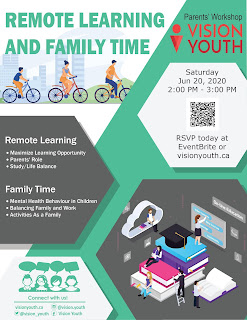July Parents' Workshop Recap: Racial Discrimination, Student Support & STEM at Home Workshop
On July 25th 2020, Vision Youth hosted an online workshop on racial discrimination, student support, and interactive Science, Technology, Engineering and Math (STEM) educational games. The workshop featured guest speakers Amy Go, the founding president of Chinese Canadian National Council for Social Justice, Youmy Han, a staff member from the Honourable Mary Ng MP’s office, and Franco Lam, a Chief Development Officer of Dotdotfire.com.
Amy Go discussed racism in schools and how the Chinese Canadian National Council for Social Justice (CCNCSJ) was founded in 1980 to educate, engage and advocate for equity and justice for all. She proceeded to explain the importance of getting children to build confidence through understanding their Chinese Canadian history and identity, and learn how to react when experiencing racist attacks or isolation. Moreover, Amy stressed the necessity of communicating with schools about the safety and racial measures that will be taken once schools reopen. Several questions that should be brought out are how the spread of the virus and racism will be prevented, if there will be tools to equip teachers to address anti-Asian racism, and the school’s policies on equity, anti-racism and inclusion. CCNCSJ has also been working on an anti-Asian racism project where an online reporting tool was made as well as social media campaigns to bring awareness. Furthermore, they will be collaborating with the City of Toronto and Vision Youth on another research project called PROTECH. Most importantly, they will be providing focus group consultations on August 8-9 for children and guardians who speak English, cantonese and mandarin. The organization can be contacted through national@ccncsj.ca.
The second portion of the workshop was continued by Youmy Han, who spoke about the government’s response to the COVID-19 pandemic. Since many students are struggling to support themselves with school and classes being interrupted, the government has added 10, 000 new jobs. They have also increased wage subsidy until February 28, 2021 to give people the opportunity to hire others for part time jobs for a longer period of time. Meanwhile, a 6 month interest fee moratorium on Canada’s student loans from March 30 to September 30 to take off financial pressure from students. Likewise, Canada Emergency Student Benefit (CESB) has provided $1250 monthly to help graduates who don't have CERB and an extra $750 per month for those who have disabilities. Additionally, Canada's service grants $500 for postsecondary students or recent graduates who want to volunteer for non profit organizations until October 31. The website canada.ca/covid19 can be visited for more information about support programs for youth and international students.
Lastly, Franco Lam introduced an organization called Dot Dot Fire, a startup from Hong Kong that has been expanded to the United States. Since online learning has started, various problems have arisen. Students are either not joining in the calls or are disengaged and unmotivated. This organization conducted an experiment where they were able to keep 10 year old students fully engaged online for over an hour. This was through the use of games; the perfect medium for motivation as it is the language of the current generation. Games can be used as a connection between teachers and students and the STEM program gives kids the chance to learn more about math, aviation and engineering principles. The class usually starts with a video game to motivate the class followed by a design project where students will continue to conduct scientific experiments outside of class. Some STEM games are also available on Dot Dot Fire’s website. Another game that is currently being made by this organization is a financial literacy game where kids can learn not to be impulsive, to be smart with money and to be a smart consumer. Through this simulation game, they must apply critical life skills, decision making and career/life choices. Overall, though remote learning can be challenging, it is necessary to find high quality education to keep kids motivated and engaged. During online learning, students will be given the opportunity to learn things that perhaps they've been wanting to learn for a long time.
All in all, the speakers from this workshop provided more insight on the action to be taken from the government as well as schools and organizations to help students adapt to the current situation.

